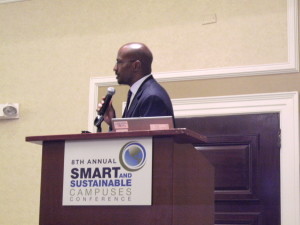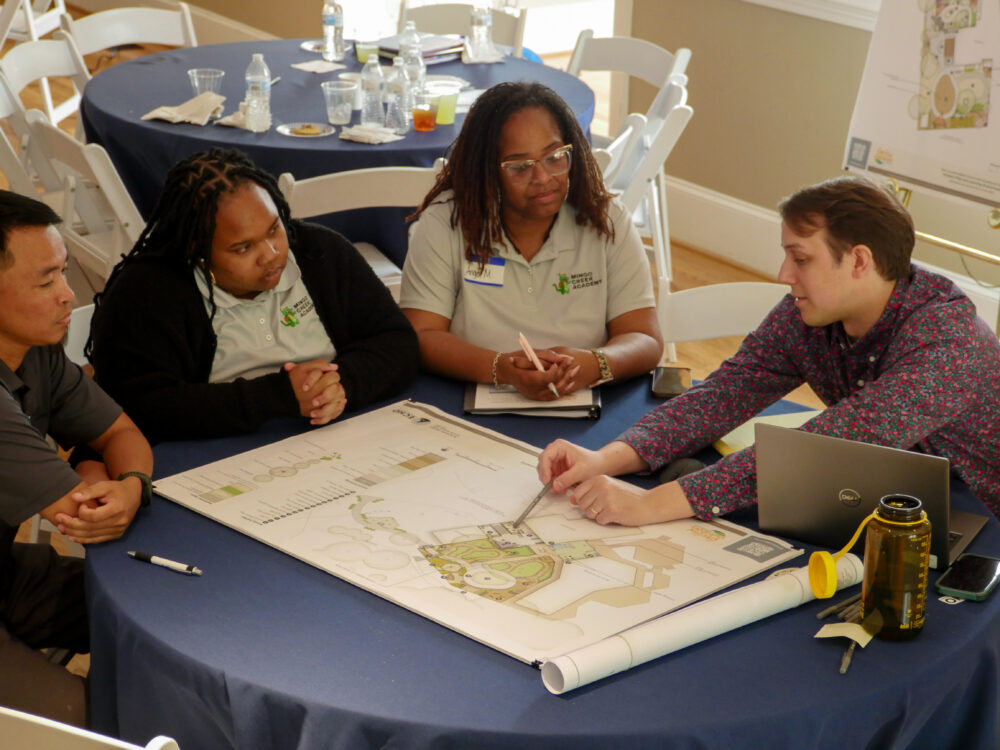We have much more to do and your continued support is needed now more than ever.
Students Lead for Smarter, more Sustainable Campuses

NWF Campus Ecology’s Julian Keniry and I hosted a workshop related to NWF Campus Ecology’s forthcoming student conservation leadership recognition program, sharing our observations and perspective on the current and future needs of students, and gaining even more insight on these and other topics from the fine folks who attended our session.
It’s interesting to me that campus sustainability leaders, in general, express similar frustrations and obstacles at initiating campus projects and pushing forward climate-smart policies. Fortunately, at our workshop and throughout the conference, we heard a ton of innovative solutions to integrate concepts of ecology and environmental responsibility into the curriculum, as well as campus-wide policy and planning decisions with great importance to reducing the college and university footprint:
- At the University of Maryland, for example, faculty can attend the Chesapeake Project, a two-day workshop “to integrate broad issues of sustainability into diverse courses.” Since 2009, over 111 courses, representing all 12 of UMD’s colleges, have been revised to include lessons or assignments about sustainability. Many of the professors help students draw the connection between local environmental issues and their studies, increasing their connection to the Chesapeake.
- Eastern Connecticut State University addresses the problem of low student attendance at campus-sponsored events by awarding involved students “priority points.” The points help boost a student’s housing lottery number, offering them first dibs on the most coveted campus housing. We of course were curious about students getting the points and then leaving halfway through a guest lecture or film, but it sounds like for the most part, the opportunity for points gets students to the event, but the content is interesting enough that they stay! Our workshop team suggested this point system could undergo some “greening” by asking resident assistants to host sustainably-themed events several times year, and increasing environmental programming overall.
We were also happy to host an exhibit booth displaying our resources to help campuses become even smarter and more sustainable. It was a pleasure to talk to so many people who are so enthusiastic and working in so many ways to reduce the ecological impact of their colleges and universities and to increase environmental literacy among students, faculty, staff and administrators. If you missed us, you can download and view NWF Campus Ecology resources here. See below for other ways to keep in touch with NWF Campus Ecology through email and social media.
Keynote speakers included Van Jones and Colin Beavan (aka “No Impact Man“) who both had encouraging, inspiring messages to share. I’ve seen Van Jones a fair amount of times (and by “fair amount of times” I mean 5), and he always has something new and motivating to say–this time, he pointed out that the last really big cultural environmental revolution here in America happened in a span of ten years. Ten years! There is hope for our immediate future, folks! Having done my fair share of blogging over the past several months, I was especially enthused to hear advice on communicating about climate and the need for climate action (or really just effective communication techniques regardless of topic) from Colin Beavan–I appreciated his reminder to inspire readers or listeners to action, rather than lay down a lot of facts in an effort to persuade. At the core of his message, Colin Beavan encouraged us to tell the stories of the everyday climate heroes–people who are leading or supporting projects for a specific, personal reason, in ways that might encourage others to step up and jump in, too.
It turns out that the conference proved valuable not only as an idea share for all sorts of campus folks, but resonated with the hotel management and staff where the conference was located–at the request of the event planners, attendees of the conference enjoyed locally sourced foods and carried their own mugs. The hotel chef has begun a local foods dinner once weekly, and the event staff will request that all future conference attendees also bring their own mugs to reduce glassware use!
Many thanks to the University of Maryland and all the fine folks who organized the 8th annual Smart and Sustainable Campuses Conference!
- View the slide presentation from the NWF Campus Ecology workshop, “Certified National Student Conservation Leaders for Sustainable Communities: How You and Your Students Can Benefit” (under the “Monday Morning Workshops, 8:40-10 AM” heading)
- Learn more about the annual Smart and Sustainable Campuses Conference
- Like NWF Campus Ecology on facebook, and follow @CampusEcology and @YouthforClimate on twitter
- Sign up for the NWF Campus Ecology e-newsletter for news on the upcoming student leadership program and more!





















